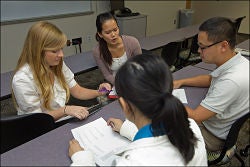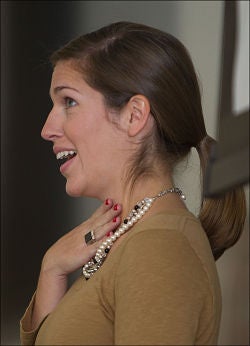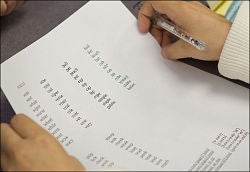Collaboration helps international students better communicate with English-speaking peers
Before leaving Saudi Arabia for North Carolina, Suleiman Al-khalifah practiced English by watching TV shows and movies
His favorites ranged from Peter Sellers’ classic comedy “Pink Panther” to the action-packed “Wanted” starring Angelina Jolie.
That type of learning, along with listening to the radio or watching TV newscasts, is encouraged by faculty in East Carolina University’s Language Academy in the Office of International Affairs.

Facing left to right, speech language pathology graduate students Ashley Wittenauer and Jenny Tang lead language academy students in an exercise in the articulation and phonology lab. Photos by Cliff Hollis, ECU News Services.
Al-khalifah is a student in the academy, an intensive English as a Second Language program aimed at increasing non-native fluency while preparing students for admission to the university.
A unique feature is the academy’s collaboration with the College of Allied Health Sciences, where students attend an articulation and phonology lab Friday afternoons.
Graduate students in the Department of Communication Sciences and Disorders work with language academy students to improve pronunciation, understanding and communication in English.
“I think it benefits both our programs,” said Dr. Rai d’Honoré, interim director of the ECU Language Academy. “We have such tremendous resources at ECU.”
In the classroom
On a recent afternoon, students learned a slight move of the tongue is the difference between an “s” and a “sh” sound. “Can you see the difference in my lips?” asked graduate student Ashley Wittenauer as she demonstrated the sounds.
They also compared “a” and “e” sounds by pronouncing similar sounding words: bed and bad, celery and salary, leg and lag.
CSDI graduate students provide encouragement and use a variety of teaching methods including a recorder to play back reading responses or a flip camera so students can see themselves. Students also are asked to keep a journal to write down instances when they’ve had trouble communicating.
Al-khalifah, 19, has been in the program for six months and plans to study biomedical engineering at ECU. He learned English in high school and informally by watching movies. “The dialogue, words, vocabulary, I was addicted to American movies and music,” he said. “I was practically talking English when I came here.”
Speaking English well will help him fit in better with students his age, he said. “Sometimes if you don’t speak well, people don’t like you or accept you,” he said. “I want to get to know people better.”
Texting and emailing are popular ways to communicate in the United States, but talking by phone is preferred in Saudi Arabia. “My father notices my English is improving,” Al-khalifah said.
Lori Kincannon, clinical supervisor in speech-language pathology, said exposure to English speakers is important, and TV, radio and lectures provide learning opportunities. Students also are asked to practice their English in daily activities such as making a purchase in a store or placing an order in a restaurant.
“The more exposure they have to English speakers in the community, the faster they learn the language and the variations in sounds and pronunciation between their accented English and standard American English,” Kincannon said.
Getting the skills to be successful
The academy offers five levels of beginning to advanced classes. Students must have an understanding of basic vocabulary to enroll in the first level. Classes meet Monday through Friday in two-hour blocks, concentrating on reading and vocabulary skills, oral communication and writing, note-taking and study skills.
“We can give them the skills they need to be able to go into college and be successful,” said d’Honoré.
Prospective international students can apply for conditional admission to ECU contingent on successful completion of the language academy and other requirements.
It happened for Lin Sun, who recently was admitted for the spring semester to the doctoral program in communication sciences and disorders.
In China, he received a bachelor’s and master’s in early childhood education and planned to be a teacher. He became more and more interested in the theory behind childhood education, which led to interest in communication disorders. “The early period for their development is very, very influential,” he said.
He discovered ECU and its highly-ranked communication sciences and disorders department after researching graduate schools in the United States. “I had made up my mind to go abroad, to travel or to study,” he said.
He started language academy classes in August, which has helped his listening skills and articulation, he said.
Beyond the regular classroom experience, d’Honoré will host a holiday tree trimming party and a lecture on Christmas in America by Kathy Spaar, the former coordinator of prayer and pilgrimage at the National Cathedral in Washington, D.C., this month. She holds a weekly lecture and film series on American life and culture. ECULA students are encouraged to participate in volunteer service. “We hope to get the students out into the community,” she said.
For more information on the ECU Language Academy, go to http://www.ecu.edu/cs-cas/ecula/, call 252-737-4377 or email ecula@ecu.edu.

Graduate clinician Kathryn Stell demonstrates a vowel sound. Photo by Cliff Hollis, ECU News Services.

The students practice pronouncing a list of words, and listen for the difference in similar-sounding words. Photo by Cliff Hollis, ECU News Services.